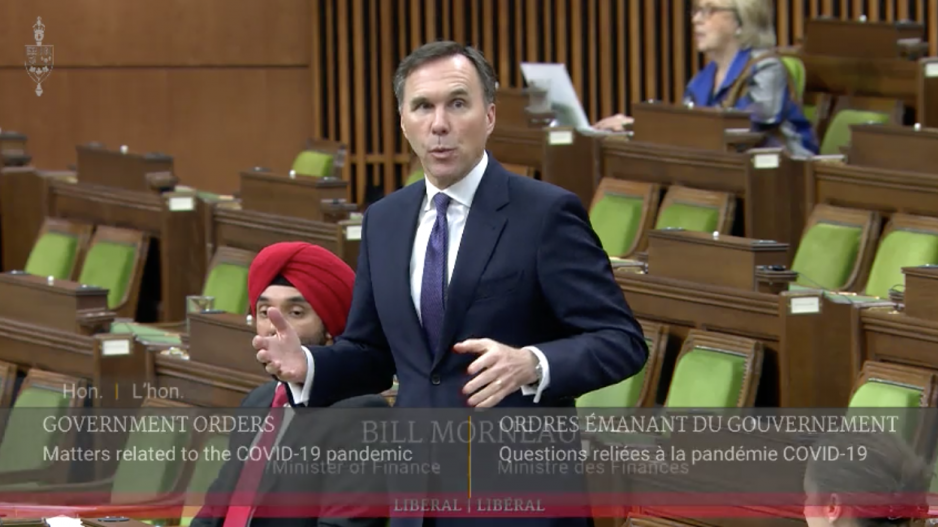Federal Finance Minister Bill Morneau confirmed Wednesday that his government is facing a deficit of more than $300 billion – a twelvefold increase over the $25 billion deficit that would have been expected, according to the Parliamentary Budget Officer (PBO), were it not for a global pandemic.
The Trudeau government announced more than $200 billion in emergency spending earlier this year, about $170 billion has been spent to date, and it is facing drops in revenue as a result of a self-induced recession and low oil prices.
The Parliamentary Budget Officer recently projected the federal budget deficit – originally estimated at $23.8 billion for 2019-20 – to be $256 billion for the 2020-21 fiscal year.
But it is likely to be even higher than that, Morneau confirmed Wednesday. He estimates the deficit at $343 billion.
As a percentage of Canada’s gross domestic product (GDP), the PBO has estimated the federal debt will rise to 44.4%, up from 34% pre-COVID.
In his fiscal and economic snapshot Wednesday, Morneau revealed that total federal pandemic-related spending will be $230 billion. There is an additional $85 billion in tax and customs duty payment deferrals.
He noted that employment in oil, gas and mining services in Canada has fallen by more than 15%, as a result of both the pandemic and crash in commodity prices, notably oil.
“The sheer scale and pace of escalation of debt no doubt raises unease, with questions on how Canadians will pay for this down the road,” Scotiabank said in a recent analysis of federal pandemic spending.
Scotiabank also noted, however, that the alternative to all that federal spending would have been severe unemployment and an even “worse” debt toll on Canadian households and businesses.
"If we had not stepped in with the Canada Emergency Wage Subsidy, millions of jobs could have been lost forever during the worst of the storm," Morneau said.
A large chunk of the emergency spending to date has been for the Canadian Emergency Response Benefit (CERB) – $53 billion – and $56 billion for the Canada Emergency Wage Subsidy (CEWAS).
The Trudeau government is now under pressure to convert those temporary income subsidies into a temporary guaranteed income.
The PBO recently calculated the cost of a guaranteed income for all Canadians for six months to be $47.5 billion to $98 billion.
Morneau did not speak to the issue of a guaranteed income program in his update.
Dealing with Canada’s new deficit and debt reality will be a long-term project, not one that Morneau can be expected to deal with in the current budget. (This year's budget was never passed, as the pandemic forced a temporary shutdown of Parliament.)
Morneau offered reassurances that Canada's debt was not excessive compared with several peer countries.
"Canada's debt structure is prudent," Morneau said. "It's spread out over the long-term, and it compares well to our G7 peers. And we will continue to make sure this is the case in the months and the years to come as we move toward recovery."
New or higher taxes is one way the federal government could deal with its debt. Trevor Tombe, an economist at the University of Calgary, has suggested a temporary tax – if such a thing exists. Once governments implement a new tax -- Canada's income tax, for example, which was a “temporary tax” implemented in 1917 during the First World War -- they find it hard to relinquish it.
Tombe also points out that, because interest rates are so low, the borrowing costs for the federal government on $150 billion translates to just $7 billion.
Canada's economy shrank 11.6% in April, according to Statistics Canada, and the PBO projects that the total decline in Canada's GDP for 2020 will be 6.8%, the biggest decline since the Great Depression. The government is hoping for a 5.5% rebound in 2021.
Conservative Leader Andrew Sheer slammed the Trudeau government for what he said was a lack of a plan to rebuild the Canadian economy and get Canadians back to work. He said other countries have announced plans for rebuilding their economies.
"So where is the prime minister's plan to set us apart?" Scheer asked.
Sheer also slammed the Trudeau government for having added $87 billion in deficit spending over four years prior to the pandemic, leaving it deeper in debt than necessary.
"His sky-high taxes, wasteful spending and massive deficits put Canada in an incredibly weak position before the pandemic began," Sheer said.
Fiscal and economic highlights and projections from today's snapshot:
Deficit, $343 billion
Real GDP, -6.8 % in 2020, 5.5% in 2021
GDP inflation, 0.5% increase in 2020
Unemployment rate, 8.8% for 2020, up from 2019 budget projects of 5.9%




